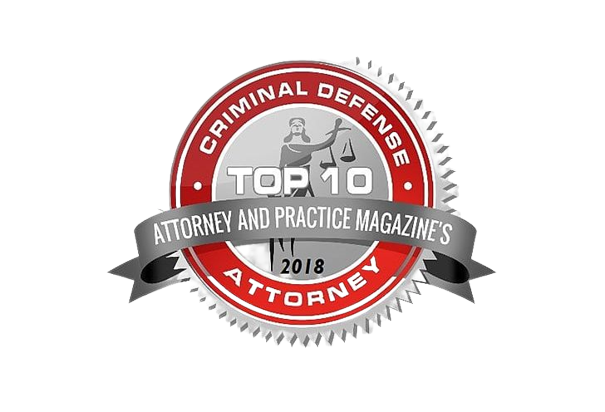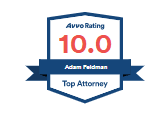Frequently Ask Question
A Former Prosecutor on Your Side
Home > FAQ

2023 Super Lawyers

AV Preeminent Rated

Best Law Firm

A+ BBB Accredited
Criminal Defense FAQ's
Being charged with a crime and or being arrested can be scary and frustrating. Here are a number of frequently asked questions that may of our clients have asked.
Q: How do I know if a particular lawyer is right for my criminal case?
A: Experience is key. Find out whether he or she specializes in criminal law, has handled cases like yours successfully, and has experience with jury trials. Past success is not a guarantee of future results, but it’s a good indication of whether a particular attorney can provide you with excellent legal representation.
Q: What’s the difference between simple assault and aggravated assault?
A: Aggravated assault requires the presence of one of ten different elements. Examples are an assault that causes serious physical injury, or assault using a deadly weapon or a dangerous instrument, among others. Simple assault is a misdemeanor, while aggravated assault is a felony.
Q: What is the difference between a misdemeanor and a felony?
A: Felonies carry a potential sentence of a year or more in prison. Most misdemeanors carry a maximum sentence of six months in county jail.
Request Your Free Consultation
More Questions?
Call us today or fill out the form to set up a free consultation
Call Today 602-540-7887
Q: How can I be charged with DUI when my blood alcohol level was under 0.08?
A: The basic DUI statute, A.R.S. 28-1381, provides that it is illegal to drive, or to be in actual physical control (APC) of a vehicle, under a number of circumstances in addition to having a BAC of 0.08 or more. Among those circumstances is driving or being in actual physical control while under the influence of alcohol or any drug, if you are “impaired to the slightest degree.” The statute goes on to list certain presumptions, depending upon your particular BAC. If your BAC is 0.05 or less, it is presumed that you were not under the influence of alcohol. If your BAC is at least 0.05, but less than 0.08, there is no presumption one way or the other. At 0.08, or above, there is a presumption that you were under the influence of intoxicating liquor. In any case, these presumptions are rebuttable, meaning that they can be overcome by other evidence in your case.
Q: I wasn’t driving at the time the police arrived? Can I still be convicted of DUI?
A: Being in actual physical control of a vehicle while under the influence can lead to a conviction under the DUI statute. The issue of whether you were in actual physical control of your car is often fact-sensitive. Issues such as whether you were sitting in the driver’s seat, whether the keys were in the ignition, whether the engine was running, whether the car was in gear, and similar questions, will all have a bearing on the result in your case. The central point is that you can be convicted of driving under the influence even when no one saw you operating your vehicle.
Q: Are sobriety checkpoints legal?
A: The legality of sobriety checkpoints is important in DUI cases, since an illegal checkpoint can form the basis for the exclusion of any evidence obtained by the police as a result of stopping your vehicle. In some cases, this can effectively eliminate any evidence of your guilt, and this could lead to a dismissal of the charges against you. As a general rule, there is nothing illegal about sobriety checkpoints, but they must, in order to pass constitutional muster, be operated in certain ways. The main issue is that the method utilized to determine which vehicles to stop must be facially neutral, that is, it must be based on a criterion that insulates against a process that allows certain issues (such as race) to play a role in the selection of drivers to stop. As a result, many checkpoints will be established with a plan to stop every third car, for example. Nevertheless, these rules are not always followed, and in some cases this can provide a basis to challenge the validity of the stop.
Q: If I get convicted of DUI, how much will it cost me?
A: When all is said and done, you can expect a first time DUI conviction to cost you more than $10,000. And that is in addition to the legal fees for your attorney. A significant portion of that amount will be the increase in insurance costs, and those increases will be incurred annually for up to three years.
Q: The police say I failed a field sobriety test. What is it, and can I still fight my DUI charge?
A: A field sobriety test (FST), according to the National Highway Traffic Safety Administration, is designed to measure sobriety. That view is not universally shared, however, and, since the focus of most field sobriety tests is coordination. You can fail a field sobriety test and be perfectly sober. There are also medical conditions that can have a major effect on how you perform on these tests. The qualifications of the person administering the tests can also be called into question. Moreover, in the final analysis, the evaluation of your performance on an FST is the result of a subjective judgment by the person who is administering the test. Subjective judgments are prone to prejudice and to mistake. A report that states you failed an FST can be challenged, and can be challenged successfully in many cases.
Q: Are there alternatives to prison for drug crimes?
A: Yes. There are alternatives to jail time. Qualification depends upon the particular drug involved, whether your offense is limited to possession for personal use, and your past criminal history.
Q: I was arrested for driving under the influence of drugs, but they were prescription drugs prescribed for me by my doctor, and I was taking them as prescribed. Can I still be convicted of violating the law regarding driving under the influence?
A: Using a prescription drug as prescribed is not a defense to a charge that you were driving while impaired. However, it would be a defense if the charge is that you were driving with a controlled substance in your system.
Award Winning Criminal Defense








Criminal Law Firm Near You
Schedule a Consultation



